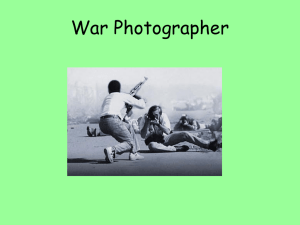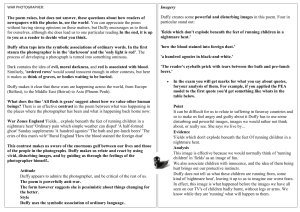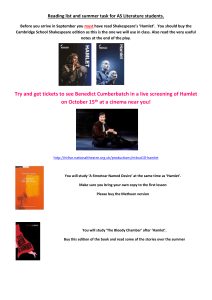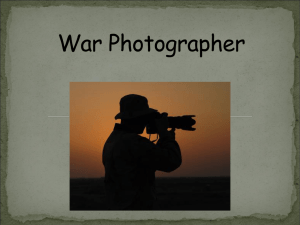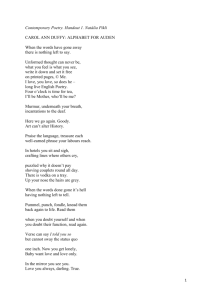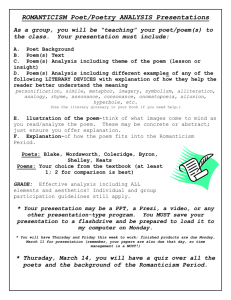Student Guide – Duffy
advertisement
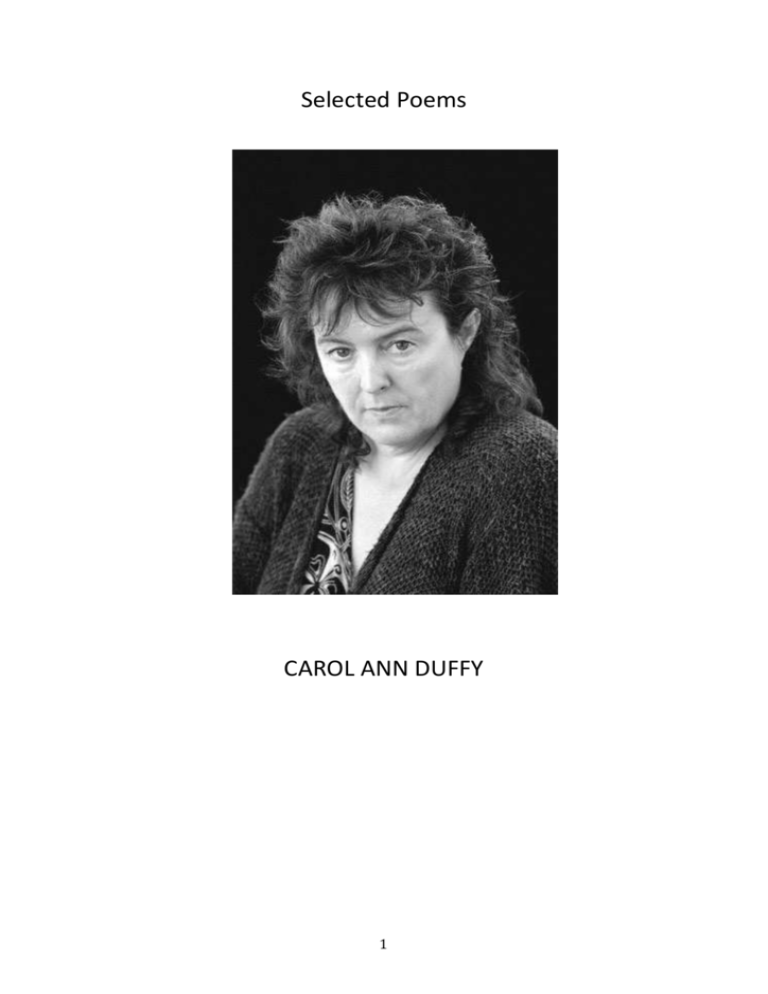
Selected Poems CAROL ANN DUFFY 1 Biographical details Born in Glasgow, the child of a Scottish father and Irish mother, the family consisting of Carol Ann and her four brothers moved to Staffordshire when she was four. Her dad Frank was a strong trade unionist, active in the Labour Party and stood as a parliamentary candidate. He followed the path of his own father, also Frank, who was one of the early leaders of the Scottish Labour movement. Carol Ann says her family weren't bookish: "My mother had to leave school at 14 and she regretted it so much - so she was determined that we were going to get the best out of our education." But mum May was more than ambitious for her children. Carol Ann says: "She was entrancing, fantastic at making up rhymes and stories. I think it was her Irish syntax and voice music that started my love of words." Carol Ann started writing poems as a teenager: "I put together my first pamphlet when I was 16 - they were awful teenage stuff." Soon afterwards she met Liverpool poet Adrian Henri. Later, when she went to Liverpool University he became what she calls "the first love of her life" even though he was a good deal older. "I lived with him for about a decade. We were friends, then lovers, then friends. I was with him when he died." The second great love of her life was the Scottish poet Jackie Kay, whom she also lived with for 10 years. "It's over now but we are still the warmest of friends. She supports me." Carol Ann is single now but lives with the greatest love in her life, her 13-year old daughter Ella, by the novelist Peter Benson. "I let her decide whether I should accept the Laureateship or not. She was all for it, she said, 'Mum. it's time a woman did it'." Carol Ann says: "I always wanted a child. Being a mother is the central thing in my life. Having a child takes you back to all those parts of your own childhood that you had hidden away." Mirror.co.uk http://www.mirror.co.uk/news/uk-news/carol-ann-duffy-poetry-is-in-your-391635#ixzz2q4Ys5czE Currently reigning as Britain's first female Poet Laureate, Carol Ann Duffy is also queen of the dramatic monologue. Duffy's poetry gives voice to society's alienated and ignored in an unstuffy but compelling manner, wrestling with ideas about language and identity. As Duffy says herself: "I like to use simple words but in a complicated way." http://www.bbc.co.uk/poetryseason/poets/carol_ann_duffy.shtml Her verses are typically "spoken in the voices of the urban disaffected, people on the margins of society who harbour resentments and grudges against the world." Although she knew she was a lesbian since her days at St. Joseph's convent school, her early love poems give no indication of her homosexuality; the object of love in her verses is someone whose gender is not specified. 2 http://www.poetryfoundation.org/bio/carol-ann-duffy In her own words… Like the sand and the oyster, it's a creative irritant. In each poem, I'm trying to reveal a truth, so it can't have a fictional beginning. I like to use simple words, but in a complicated way. Like the sand and the oyster, it's a creative irritant. In each poem, I'm trying to reveal a truth, so it can't have a fictional beginning. I always wanted a child. Being a mother is the central thing in my life. The poem is the literary form of the 21st century. It's able to connect young people in a deep way to language... it's language as play. Her poems Many of the poems are also supported here by critical analysis taken from a variety of sources. BE CAREFUL. Do not use these as a substitute for your own thinking. Do not quote directly or even use the ideas unless you credit them and provide some comment on whether you agree or not. Definition of DRAMATIC MONOLOGUE : a literary work (as a poem) in which a speaker's character is revealed in a monologue usually addressed to a second person http://www.merriam-webster.com/ The reason poets choose to write poems like this is to express a point of view through the words of a character. However, the tricky part is that often the opinions stated by that character are not the same as the views of the poet. Most of the time, the speaker is trying to convince someone of something, and may or may not be telling the whole truth. Sometimes what the speaker doesn't say is just as revealing and interesting as what he or she does say in the poem. http://www.cliffsnotes.com/ Persona : A dramatic character, distinguished from the poet, who is the speaker of a poem. http://www.poetryfoundation.org/ 3 Before You Were Mine (MT) I'm ten years away from the corner you laugh on with your pals, Maggie McGeeney and Jean Duff. The three of you bend from the waist, holding each other, or your knees, and shriek at the pavement. Your polka-dot dress blows round your legs. Marilyn. 1 5 I'm not here yet. The thought of me doesn't occur in the ballroom with the thousand eyes, the fizzy, movie tomorrows the right walk home could bring. I knew you would dance like that. Before you were mine, your Ma stands at the close with a hiding for the late one. You reckon it's worth it. 10 The decade ahead of my loud, possessive yell was the best one, eh? I remember my hands in those high-heeled red shoes, relics, and now your ghost clatters toward me over George Square till I see you, clear as scent, under the tree, with its lights, and whose small bites on your neck, sweetheart? 15 Cha cha cha! You'd teach me the steps on the way home from Mass, stamping stars from the wrong pavement. Even then I wanted the bold girl winking in Portobello, somewhere in Scotland, before I was born. That glamorous love lasts where you sparkle and waltz and laugh before you were mine. 20 ps://www.youtube.com/watch?v=eXqdN5CDcVk http://www.tusitala.org.uk/carol-ann-duffy-before-you-were-mine-an-analysisrevisited/ 4 Nostalgia (MT) Those early mercenaries, it made them ill leaving the mountains, leaving the high, fine air to go down, down. What they got was money, dull crude coins clenched in the teeth; strange food, the wrong taste, stones in the belly; and the wrong sounds, the wrong smells, the wrong light, every breath wrong. They had an ache here, Doctor, they pined, wept, grown men. It was killing them. 1 It was given a name. Hearing tell of it, there were those who stayed put, fearful of a sweet pain in the heart; of how it hurt, in the heavier air, to hear the music of home - the sad pipes - summoning, in the dwindling light of the plains, a particular place - where maybe you met a girl, or searched for a yellow ball in long grass, found it just as your mother called you in. 10 5 15 But the word was out. Some would never fall in love had they not heard of love. 20 So the priest stood at the stile with his head in his hands, crying at the workings of memory through the colour of leaves, and the schoolteacher opened a book to the scent of her youth, too late. It was spring when one returned, with his life 25 in a sack on his back, to find the same street with the same sign on the inn, the same bell chiming the hour on the clock, and everything changed. General Guiding questions 1. Consider Duffy’s attitude towards her subject. 2. Comment on her use of figurative language. 3. Trace the development of narrative and ideas in the poem. 5 Specific questions Stanza 1 “mercenaries” = people who work solely for money Which words are repeated + why ? Which of the following types of imagery are present – visual, olfactory, gustatory, tactile, auditory, kinesthetic ? What auditory technique is used in line 4 and with what effect ? How does the tone + sense of address change in line 8 What is the “it” in line 9 ? Stanza 2 What is the “it” in line 10 ? How does the idea of a “sweet pain in the heart” relate to the dictionary definitions of “nostalgia” ? How does line 16 relate to line 8 ? (Also compare “glamorous hell” in ‘You’) Stanza 3 What are the two senses in which the expression “the word was out” are used ? Try to explain the line “Some would never / fall in love had they not heard of love.” Try to explain why the priest is crying. (Think about leaves in Autumn). Try to explain why the schoolteacher is crying. Why choose a priest and a schoolteacher ? Explain “with his life / in a sack on his back.” Which word is repeated several times in this stanza ? Why ? What abrupt opposite is introduced in the final line ? Why idea do you think is represented by the clock ? http://www.youblisher.com/p/487104-Nostalgia-Carol-Ann-Duffy/ After analysis and discussion – see handout 6 Litany (MT) The soundtrack then was a litany -- candlewick bedspread three piece suite display cabinet -and stiff-haired wives balanced their red smiles, passing the catalogue. Pyrex. A tiny ladder ran up Mrs Barr's American Tan leg, sly like a rumour. Language embarrassed them. The terrible marriages crackled, cellophane round polyester shirts, and then The Lounge would seem to bristle with eyes, hard as the bright stones in engagement rings, and sharp hands poised over biscuits as a word was spelled out. An embarrassing word, broken 1 5 10 to bits, which tensed the air like an accident. This was the code I learnt at my mother's knee, pretending to read, where no one had cancer, or sex, or debts, and certainly not leukaemia, which no one could spell. The year a mass grave of wasps bobbed in a jam-jar; a butterfly stammered itself in my curious hands. A boy in the playground, I said, told me to fuck off; and a thrilled, malicious pause salted my tongue like an imminent storm. Then uproar. I'm sorry, Mrs Barr, Mrs Hunt, Mrs Emery, sorry, Mrs Raine. Yes, I can summon their names. My mother's mute shame. The taste of soap. After discussion - See handout 7 20 In Mrs Tilscher’s Class TOC) You could travel up the Blue Nile 1 with your finger, tracing the route while Mrs Tischer chanted the scenery. Tana. Ethiopia. Khartoum. Aswan. That for an hour, then a skittle of milk 5 and chalky pyramids rubbed into dust. A window opened with a long pole. The laugh of a bell swung by a running child. This was better than home. Enthralling books. The classroom glowed like a sweetshop. 10 Sugar paper. Coloured shapes. Brady and Hindley faded, like the faint, uneasy smudge of a mistake. Mrs Tilscher loved you. Some mornings, you found she’d left a gold star by your name. The scent of a pencil slowly, carefully, shaved. 15 A xylophone’s nonsense heard from another form. Over the Easter term, the inky tadpoles changed from commas into exclamation marks. Three frogs hopped in the playground, freed by a dunce, followed by a line of kids, jumping and croaking 20 away from the lunch queue. A rough boy told you how you were born. You kicked him, but stared at your parents, appalled, when you got back home. That feverish July, the air tasted of electricity. A tangible alarm made you always untidy, hot, fractious under the heavy, sexy sky. You asked her how you were born and Mrs Tilscher smiled, then turned away. Reports were handed out. You ran through the gates, impatient to be grown, as the sky split open into a thunderstorm. 8 25 30 We Remember Your Childhood Well (TOC) Nobody hurt you. Nobody turned off the light and argued 1 with somebody else all night. The bad man on the moors was only a movie you saw. Nobody locked the door. Your questions were answered fully. No. That didn't occur. You couldn't sing anyway, cared less. The moment's a blur, a Film Fun laughing itself to death in the coal fire. Anyone's guess. 5 Nobody forced you. You wanted to go that day. Begged. You chose the dress. Here are the pictures, look at you. Look at us all, smiling and waving, younger. The whole thing is inside your head. What you recall are impressions; we have the facts. We called the tune. 10 The secret police of your childhood were older and wiser than you, bigger than you. Call back the sound of their voices. Boom. Boom. Boom. Nobody sent you away. That was an extra holiday, with people you seemed to like. They were firm, there was nothing to fear. There was none but yourself to blame if it ended in tears. 15 What does it matter now? No, no, nobody left the skidmarks of sin on your soul and laid you wide open for Hell. You were loved. Always. We did what was best. We remember your childhood well. http://www.bbc.co.uk/schools/gcsebitesize/english_literature/poetduffy/werememb eract.shtml http://www.sheerpoetry.co.uk/gcse/carol-ann-duffy/michael-woods-on-carol-annduffy/we-remember-your-childhood-well 9 Elements of feminism in Duffy’s writing In her collection The World's Wife (1999), Duffy undermines masculinist representations of female identity by giving voice to the women behind successful or mythical men. She satirises traditional discourses in order to re-present the women as the holders of power. The limitations of representation is a theme which recurs throughout much of Carol Ann Duffy's work, demonstrated most effectively by her insistence on the use of the dramatic monologue: giving voice rather than constructing images. In this way, she challenges the masculinist representations of female identity that pervade historical and literary discourse, and women's lived experience. Her writing examines power and gender relations and accepted stereotypes, ultimately foregrounding the unstable and erroneous identities that they foster. As a result, Duffy recovers the voices of previously marginalised and silenced figures, re-inscribing mythic and historical discourses with a vocal female figure … ("Knowing who we are, and finding a way to tell ourselves”: Carol Ann Duffy's Revision of Masculinist Representations of Female Identity. Claire McEwen) 10 Little Red Cap (WW) At childhood’s end, the houses petered out into playing fields, the factory allotments kept, like mistresses, by kneeling married men, the silent railway line, the hermit’s caravan, till you came at last to the edge of the woods, It was there that I first clapped eyes on the wolf. 1 5 He Stood in a clearing, reading his verse out loud in his wolfy drawl, a paperback in his hairy paw, red wine staining his bearded jaw. What big ears he had! What big eyes he had! What teeth! 10 in the interval, I made quite sure he spotted me, sweet sixteen, never been, babe, waif, and bought me a drink, my first. You might ask why. Here’s why. Poetry. The Wolf, I knew, would lead me deep into the woods, away from home, to a dark tangled thorny place lit by the eyes of owls. I crawled in his wake, my stockings ripped to shreds, scraps of red from my blazer snagged on twig and branch, murder clues. I lost both shoes but got there, wolf’s lair, better beware. Lesson one that night, breath of the wolf in my ear, was the love poem. I clung till dawn to his thrashing fur, for what little girl doesn’t dearly love a wolf? Then I slid from between his heavy matted paws and went in search of a living bird – white dovewhich flew, straight from my hands to his open mouth. One bite, dead. How nice, breakfast in bed, he said, licking his chops. As soon as he slept, I crept to the back of the lair, where a whole wall was crimson, gold, aglow with books. Words, words were truly alive on the tongue, in the head, warm, beating, frantic, winged; music and blood. But then I was young – and it took ten years in the woods to tell that a mushroom stoppers the mouth of a buried corpse, that birds are the uttered thought of trees, that a greying wolf howls the same old song at the moon, year in, year out, season after season, sane rhyme, same reason. I took an axe to a willow to see how it wept. I took an axe to a salmon to see how it leapt. I took an axe to the wolf as he slept, one chop, scrotum to throat, and saw the glistening, virgin white of my grandmother’s bones. I filled his belly with stones. I stitched him up. Out of the forest I come with my flowers, singing, all alone. See interview with the poet - handout 11 15 20 25 30 35 40 Marxist literary theories tend to focus on the representation of class conflict as well as the reinforcement of class distinctions through the medium of literature. Marxist theorists use traditional techniques of literary analysis but subordinate aesthetic concerns to the final social and political meanings of literature. Marxist theorist often champion authors sympathetic to the working classes and authors whose work challenges economic equalities found in capitalist societies. http://www.iep.utm.edu/literary/#H4 "Standing Female Nude" (1985) (SFN) Six hours like this for a few francs. 1 Belly nipple arse in the window light, he drains the color from me. Further to the right, Madame. And do try to be still. I shall be represented analytically and hung 5 in great museums. The bourgeoisie will coo at such an image of a river-whore. They call it Art. Maybe. He is concerned with volume, space. I with the next meal. You're getting thin, Madame, this is not good. My breasts hang slightly low, the studio is cold. In the tea-leaves I can see the Queen of England gazing on my shape. Magnificent, she murmurs, moving on. It makes me laugh. His name 10 is Georges. They tell me he's a genius. 15 There are times he does not concentrate and stiffens for my warmth. He possesses me on canvas as he dips the brush repeatedly into the paint. Little man, you've not the money for the arts I sell. 20 Both poor, we make our living how we can. I ask him Why do you do this? Because I have to. There's no choice. Don't talk. My smile confuses him. These artists take themselves too seriously. At night I fill myself 25 with wine and dance around the bars. When it's finished he shows me proudly, lights a cigarette. I say Twelve francs and get my shawl. It does not look like me. Grand Nu – Georges Braque Guiding questions http://www.morelearning.net/KS5/CarolAnnDuffy/Standing%20Female%20Nude%201.pdf 12 Duffy's poetry has always had a strong feminist edge, however. This position is especially well captured in her Standing Female Nude, in which the collection's title poem consists of an interior monologue comprising a female model's response to the male artist who is painting her image in a Cubist style. Although at first the conversation seems to indicate the model's acceptance of conventional attitudes about beauty in art—and, by extension, what an ideal woman should be—as the poem progresses Duffy deconstructs these traditional beliefs. Ultimately, the poet expresses that "the model cannot be contained by the visual art that would regulate her," explained DiMarco. "And here the way the poem ends with the model's final comment on the painting 'It does not look like me'—is especially instructive. On the one hand, her response suggests that she is naive and does not understand the nature of Cubist art. On the other hand, however, the comment suggests her own variableness, and challenges traditionalist notions that the naked model can, indeed, be transmogrified into the male artist's representation of her in the nude form. To the model, the painting does not represent either what she understands herself to be or her lifestyle." http://www.poetryfoundation.org/bio/carol-ann-duffy Havisham (MT) Beloved sweetheart bastard. Not a day since then I haven't wished him dead. Prayed for it so hard I've dark green pebbles for eyes, ropes on the back of my hands I could strangle with. 1 Spinster. I stink and remember. Whole days in bed cawing Nooooo at the wall; the dress yellowing, trembling if I open the wardrobe; the slewed mirror, full-length, her, myself, who did this to me? Puce curses that are sounds not words. Some nights better, the lost body over me, my fluent tongue in its mouth in its ear then down till suddenly bite awake. Love's 5 hate behind a white veil; a red balloon bursting in my face. Bang. I stabbed at a wedding cake. Give me a male corpse for a long slow honeymoon. Don't think it's only the heart that b-b-b-breaks After discussion of the poem - handout 13 10 15 Anne Hathaway (WW) 'Item I gyve unto my wife my second best bed ...' (from Shakespeare's will) The bed we loved in was a spinning world of forests, castles, torchlight, clifftops, seas where we would dive for pearls. My lover's words were shooting stars which fell to earth as kisses on these lips; my body now a softer rhyme to his, now echo, assonance; his touch a verb dancing in the centre of a noun. Some nights, I dreamed he'd written me, the bed a page beneath his writer's hands. Romance and drama played by touch, by scent, by taste. In the other bed, the best, our guests dozed on, dribbling their prose. My living laughing love I hold him in the casket of my widow's head as he held me upon that next best bed. 1 5 10 Duffy: I suppose I would call this a relaxed sonnet, rhythmically it is, and the rhyme is “relaxed”: echoed in “a softer rhyme/to his”, doing that in the poem as well as in the relationship. And this is, on a quite simple level, about Shakespeare and sexual feelings, and love, my life, our lives. The poem is challenging the interpretation of his will as being an insult to her. The poem is about memory, and how he lives not only in memory but in love, in poetry; she holds him both in the poem and in her “widow’s head”. But she prefers to have a casket where you might keep ashes. CAD: Sonnets remind me of prayers. And they use rhymes, metre, and are only fourteen lines long, so I think they’re very good for poems which are for all of us--like love poems or elegies or spiritual moments. I think the sonnet form is good for holding those moments, as prayers are or psalms. And you can memorise sonnets better than other forms. So I like to use it when I write in those areas—death or love or spiritual issues. Though they can be used for comedy… Mrs. Icarus (WW) I’m not the first or the last To stand on a hillock, Watching the man she married Prove to the world He’s a total, utter, absolute, Grade A pillock. 14 Mrs Midas (WW) It was late September. I'd just poured a glass of wine, begun to unwind, while the vegetables cooked. The kitchen filled with the smell of itself, relaxed, its steamy breath gently blanching the windows. So I opened one, then with my fingers wiped the other's glass like a brow. He was standing under the pear tree snapping a twig. 1 5 Now the garden was long and the visibility poor, the way the dark of the ground seems to drink the light of the sky, but that twig in his hand was gold. And then he plucked a pear from a branch - we grew Fondante d'Automne and it sat in his palm like a light bulb. On. I thought to myself, Is he putting fairy lights in the tree? 10 He came into the house. The doorknobs gleamed. He drew the blinds. You know the mind; I thought of the Field of the Cloth of Gold and of Miss Macready. He sat in that chair like a king on a burnished throne. The look on his face was strange, wild, vain. I said, What in the name of God is going on? He started to laugh. 15 I served up the meal. For starters, corn on the cob. Within seconds he was spitting out the teeth of the rich. He toyed with his spoon, then mine, then with the knives, the forks. He asked where was the wine. I poured with shaking hand, a fragrent, bone-dry white from Italy, then watched as he picked up the glass, goblet, golden chalice, drank. It was then that I started to scream. He sank to his knees. After we had both calmed down, I finished the wine on my own, hearing him out. I made him sit on the other side of the room and keep his hands to himself. I locked the cat in the cellar. I moved the phone. The toilet I didn't mind. I couldn't believe my ears: how he'd had a wish. Look, we all have wishes; granted. But who has wishes granted? Him. Do you know about gold? It feeds no one; aurum, soft, untarnishable; slakes no thirst. He tried to light a cigarette; I gazed, entranced, as the blue flame played on its luteous stem. At least, I said, you'll be able to give up smoking for good. Seperate beds. In fact, I put a chair against my door, near petrified. He was below, turning the spare room 15 20 25 30 35 into the tomb of Tutankhamun. You see, we were passionate then, in those halcyon days; unwrapping each other, rapidly, 40 like presents, fast food. But now I feared his honeyed embrace, the kiss that would turn my lips to a work of art. And who, when it comes to the crunch, can live with a heart of gold? That night, I dreamt I bore his child, its perfect ore limbs, its little tongue like a precious latch, its amber eyes holding their pupils like flies. My dream-milk burned in my breasts. I woke to the streaming sun. So he had to move out. We'd a caravan in the wilds, in a glade of its own. I drove him up under cover of dark. He sat in the back. And then I came home, the women who married the fool who wished for gold. At first I visited, odd times, parking the car a good way off, then walking. 45 50 You knew you were getting close. Golden trout on the grass. One day, a hare hung from a larch, a beautiful lemon mistake. And then his footprints, glistening next to the river's path. He was thin, delirious; hearing, he said, the music of Pan from the woods. Listen. That was the last straw. What gets me now is not the idiocy or greed but lack of thought for me. Pure selfishness. I sold the contents of the house and came down here. I think of him in certain lights, dawn, late afternoon, and once a bowl of apples stopped me dead. I miss most, even now, his hands, his warm hands on my skin, his touch. Mrs Darwin (WW) 7 April 1852. Went to the Zoo. I said to Him – Something about that Chimpanzee over there reminds me of you. 16 55 60 65 MEDUSA (WW) A suspicion, a doubt, a jealousy 1 grew in my mind, which turned the hairs on my head to filthy snakes as though my thoughts hissed and spat on my scalp. My bride’s breath soured, stank in the grey bags of my lungs. I’m foul mouthed now, foul tongued, yellow fanged. There are bullet tears in my eyes. Are you terrified? 10 Be terrified. It’s you I love, perfect man, Greek God, my own; but I know you’ll go, betray me, stray from home. So better by for me if you were stone. I glanced at a buzzing bee, a dull grey pebbly fell to the ground. I glanced at a singing bird, a handful of dusty gravel spattered down 20 I looked at a ginger cat, a housebrick shattered a bowl of milk. I looked at a snuffling pig, a boulder rolled in a heap of shit. I stared in the mirror. Love gone bad 30 showed me a Gorgon. I stared at a dragon. Fire spewed from the mouth of a mountain. And here you come with a shield for a heart and a sword for a tongue 25 35 and your girls, your girls. Wasn’t I beautiful Wasn’t I fragrant and young? 5 40 Look at me now. 17 15 15 Medusa was one of the Gorgons and was slain by Perseus. Her hair was comprised of snakes. Her appearance was reputedly enough to turn anyone who looked at her to stone. Athena held a shield of polished bronze up so that Perseus could see the reflection of Medusa and decapitated her with his sword of adamant given to him by Hermes. He took her head away in his shoulder bag. He was pursued by her sisters, Stheno and Euryale but was rendered invisible to them by the helmet he borrowed from Hades. http://sheerpoetry.co.uk/advanced/carol-ann-duffy/notes-on-selected-poems-advanced/medusa See interview with the poet – handout Notes from Sheer Poetry - http://sheerpoetry.co.uk/advanced/carol-ann-duffy/notes-on-selected-poems-advanced/medusa War Photographer (SFN) In his darkroom he is finally alone with spools of suffering set out in ordered rows. The only light is red and softly glows, as though this were a church and he a priest preparing to intone a Mass. Belfast. Beirut. Phnom Penh. All flesh is grass. He has a job to do. Solutions slop in trays beneath his hands which did not tremble then though seem to now. Rural England. Home again to ordinary pain which simple weather can dispel, to fields which don't explode beneath the feet of running children in a nightmare heat. 1 5 10 Something is happening. A stranger's features faintly start to twist before his eyes, a half-formed ghost. He remembers the cries of this man's wife, how he sought approval without words to do what someone must and how the blood stained into foreign dust. A hundred agonies in black-and-white from which his editor will pick out five or six for Sunday's supplement. The reader's eyeballs prick with tears between bath and pre-lunch beers. From aeroplane he stares impassively at where he earns a living and they do not care. 18 15 20 At the time 'War Photographer' was written, Duffy was friendly with Don McCullin and Philip Jones Griffiths, two very well-respected stills photographers who specialised in war photography. She says in the programme that what interested her in writing the poem was the photographer and the difficult decisions he or she might have to make while taking pictures in a war zone. The poem contrasts the peaceful sounds and security of the darkroom where the photographer is printing his pictures with the 'nightmare heat' and chaos of the battle zone. The soft red glow of the safelight is set against the colours of the battlefield - blinding flashes and 'blood stained into foreign dust'. The screams and chaotic noises of the war zone are contrasted with the quietness of the darkroom - 'as though this were a church and he / a priest'. The vivid and bitter memories of the photographer - 'the cries / of this man's wife' - associated with the photographs he has taken in difficult situations are contrasted with the casual involvement of the photographer's audience - the readers of the Sunday papers, whose editor has chosen 'five or six' of the photographer's most dramatic pictures for their Sunday morning entertainment. In the final two lines of the poem the reader is confused (perhaps intentionally) as to who 'they' are. Is the photographer staring down from his aeroplane as he returns to the battlefield looking at the houses of his readers who 'do not care' - or is he leaving the battlefield where it is the dead who 'do not care'? What Carol Ann Duffy Said 'Those photographs are in the background but I'm more interested in the photographer... in the dilemma of someone who has that as a job... to go to these places and come back with the images.' Carol Ann Duffy - Passwords 1998 The Falling Soldier Comments on this photo: http://www.pbs.org/wnet/americanmasters/episodes/robert-capa/in-love-and-war/47 19 (From TB) 20 LAST POST In all my dreams, before my helpless sight, He plunges at me, guttering, choking, drowning. 1 If poetry could tell it backwards, true, begin that moment shrapnel scythed you to the stinking mud... but you get up, amazed, watch bled bad blood run upwards from the slime into its wounds; see lines and lines of British boys rewind back to their trenches, kiss the photographs from home mothers, sweethearts, sisters, younger brothers not entering the story now to die and die and die. Dulce - No - Decorum - No - Pro patria mori. You walk away. 5 10 You walk away; drop your gun (fixed bayonet) like all your mates do too Harry, Tommy, Wilfred, Edward, Bert and light a cigarette. There''s coffee in the square, warm French bread and all those thousands dead are shaking dried mud from their hair and queueing up for home. Freshly alive, a lad plays Tipperary to the crowd, released from History; the glistening, healthy horses fit for heroes, kings. You lean against a wall, your several million lives still possible and crammed with love, work, children, talent, English beer, good food. You see the poet tuck away his pocket-book and smile. If poetry could truly write it backwards, then it would. 15 20 25 Some background to the poem: http://www.mirror.co.uk/news/uk-news/poet-laureate-carol-ann-duffys-409674 Youtube reading - https://www.youtube.com/watch?v=eItm1xbAwoo Wilfred Owen’s Dulce Et Decorum Est - http://www.warpoetry.co.uk/owen1.html 21 Valentine (MT) Not a red rose or a satin heart. 1 I give you an onion. It is a moon wrapped in brown paper. It promises light like the careful undressing of love. 5 www.wwtt.org. Here. It will blind you with tears Like a lover. It will make your reflection a wobbling photo of grief. 10 I am trying to be truthful. Not a cute card or a kissogram. I give you an onion. Its fierce kiss will stay on your lips, possessive and faithful as we are, for as long as we are. 15 Take it. Its platinum loops shrink to a wedding ring, if you like. Lethal. Its scent will cling to your fingers, cling to your knife. See worksheet Notes - See handout 22 20 Poems from ‘Rapture’ Duffy's seventh collection is something of a departure for the poet regularly hailed as Britain's ‘best-loved’. Gone is the sharp sense of history, the wry snap of modern life, the distinct yet palatable feminism; all those competing stories she delighted in telling have dissolved, it seems, in the single most important story of all, that of the human love affair. These poems are intent as an obsessed lover upon their subject, returning to the same sacred images, waxing and waning through all the stages of infatuation from the disbelieving first flush of the opening poem, ‘You’, to ‘the death of love’ in the closing poem, ‘Over’. http://www.towerpoetry.org.uk New Year (R) I drop the dying year behind me like a shawl 1 and let it fall. The urgent fireworks fling themselves against the night, flowers of desire, love’s fervency. Out of the space around me, standing here, I shape your absent body against mine. You touch me as the giving air. 5 Most far, most near, your arms are darkness, holding me, so I lean back, lip-read the heavens talking on in light, syllabic stars. I see, at last, they pray at us. Your breath is midnight’s, living, on my skin, across the miles between us , fields and motorways and towns, the million lit-up little homes. 10 This love we have, grief in reverse, full rhyme, wrong place, wrong time, sweet work for hands, the heart’s vocation, flares to guide the new year in, the days and nights far out upon the sky’s dark sea. Your mouth is snow now on my lips, cool, intimate, first kiss, a vow. Time falls and falls through endless space, to when we are. 23 15 You (R) Uninvited, the thought of you stayed too late in my head, 1 so I went to bed, dreaming you hard, hard, woke with your name, like tears, soft, salt, on my lips, the sound of its bright syllables like a charm, like a spell. Falling in love 5 Is glamorous hell; the crouched, parched heart like a tiger ready to kill; a flame’s fierce licks under the skin. Into my life, larger than life, beautiful, you strolled in. I hid in my ordinary days, in the long grass of routine, in my camouflage rooms. You sprawled in my gaze, staring back from anyone’s face, from the shape of a cloud, from the pining, earth-struck moon which gapes at me as I open the bedroom door. The curtains stir. There you are on the bed, like a gift, like a touchable dream. 24 10 TEXT I tend the mobile now 1 like an injured bird We text, text, text our significant words. I re-read your first, 5 your second, your third, look for your small xx, feeling absurd. The codes we send arrive with a broken chord. 10 I try to picture your hands, their image is blurred. Nothing my thumbs press will ever be heard. 14 25


